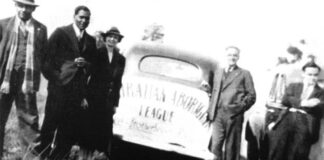Billionaire Andrew Forrest is in damage control after trying to bully Aboriginal native title holders into giving him control of their land. Solidarity spoke with Michael Woodley, CEO of the Yindjibarndi Aboriginal Corporation, which holds the native title rights
A video released on the web shows Forrest and employees of his Fortescue Metals Group (FMG) railroading a meeting of the Yindjibarndia community into accepting a mining deal.
The video, posted online in April, shows FMG aggressively controlling the agenda of a Yindjibarndi Native Title meeting, treating community leaders with contempt. FMG resorted to legal threats against Vimeo to have the video taken down.
The Yindjibarndia people are locked in a bitter dispute with FMG, who want to use their land in WA’s Pilbara for the Solomon Hub iron ore project. They have a successful Native Title claim, and further legal determinations pending over other land FMG wants to get their hands on.
FMG is trying to force a deal that would see the Yindjibarndi forfeit all rights to their land. They would only be guaranteed $4 million per year—despite FMG expecting more than $9 billion per year in revenue.
FMG are also promising $6 million per year for services such as training, health, housing and education. This deal would provide only one-tenth the revenue being offered by other miners such as Rio Tinto in Native Title negotiations. Royalties are capped, rather than the regular practice of being fixed at a percentage of earnings.
FMG have begun a public relations campaign to counter a fierce backlash. Writing in the West Australian, Andrew Forrest said that royalties paid to Aboriginal communities, “replace government welfare with mining welfare” and “foster a handout mentality”. Forrest said that rather than pay cash for use of Aboriginal land, he would provide jobs and services to “provide a future where they are expected to work and take responsibility for themselves and their children”.
Forrest is also the head of a corporate campaign called “Generation One”, which promised to create 50,000 jobs for Aboriginal people, but has only delivered 4200 positions in two and a half years. Senate estimates in February revealed only 282 of those positions have lasted longer than 26 weeks.
Could you talk about the divide and conquer tactics being used by FMG in these negotiations?
Last year we came to a breakdown in terms of our three year negotiations. The company kept saying if you’re not going to take our deal, we’re going to take the land from you anyways.
We respectfully asked them to leave our community alone. But FMG bank rolled a splinter corporation to support their deal.
They put an anthropologist into the community full time and his mandate was to develop the splinter group. They’ve now got a few people in the community, [and are] making promises, conning them up. Short term, offering them a $500,000 signing fee.
How do you feel about the Native Title system after this experience?
Native Title legislation is really a discriminating process to legitimise the taking of Indigenous people’s land by government and industry. There are no rights in this law whatsoever that protect Aboriginal people and our country, culture, heritage and religion
If we don’t do a deal, the company threatens us that they’re going to get the land anyway and we know they will. That puts poor people in a very compromising position.
Can you talk about the living conditions that Yindjibarndi people have at the moment?
Where we live in a place called Roebourne, we are surrounded by industry and by wealth, but we are still being neglected. We’ve been second class citizens from day one, denied basic government support. They see this as too big a problem to fix, so they take the easy way out in terms of getting industry approvals across the line and then leaving responsibilities to the miners. But all the miners want to do is get their project up and running and they will run over poor Indigenous people if they have to.
At the end of the day, we want an opportunity to develop our own structures in terms of self-determination. We have a good [Aboriginal] corporation and good leaders, robust people who can debate and know what the issues are. But we are not being respected as people with the education or the intelligence to do that.
You’ve been very critical of Andrew Forrest.
People are starting to see through the lies and propaganda of Generation One that Andrew Forrest loves Aboriginal people and he wants to help them and so on. At the end of the day, we did not ask for Andrew Forrest to step up and be our protector.
Andrew Forrest doesn’t trust Aboriginal people to manage their own affairs. It’s a very racist position. Forrest has his own ideology and that’s what he is imposing on us. Yindjibarndi culture, country and people are all one, we are all connected to each other. While Forrest doesn’t understand that, he’s not taking in properly who we are and what has sustained our society for the past 30,000 years.





